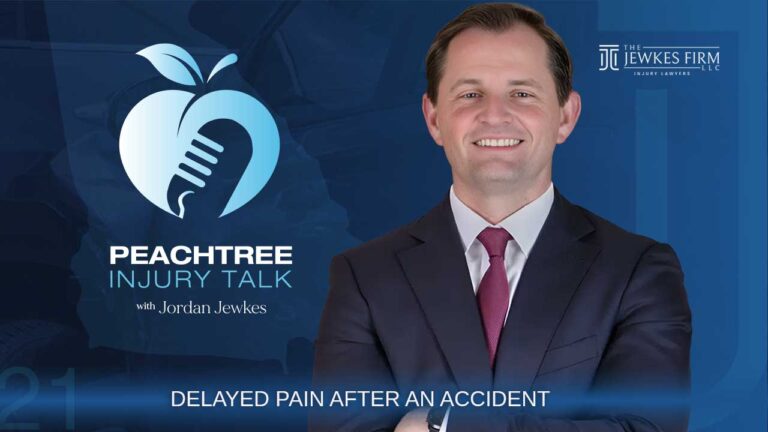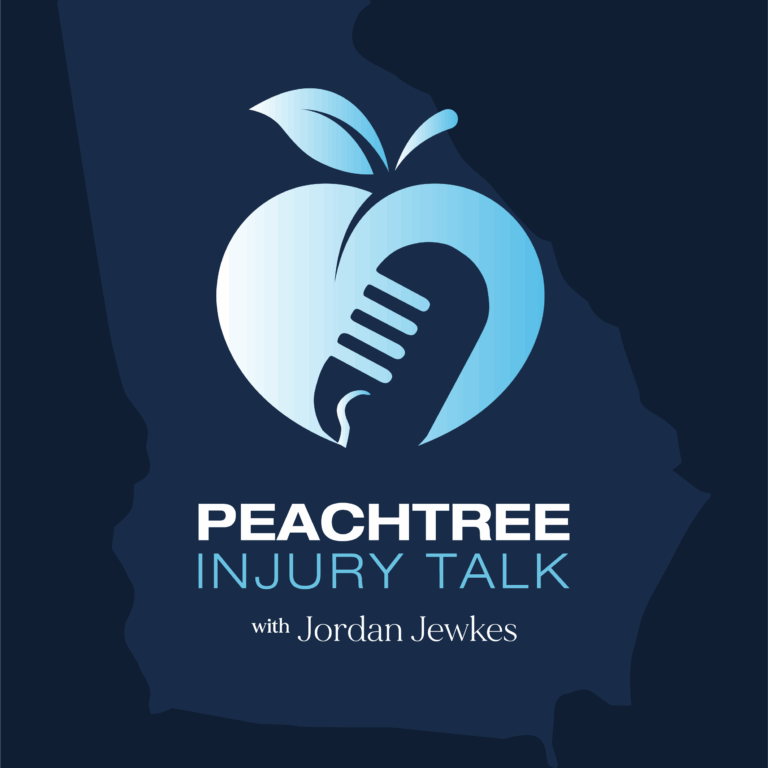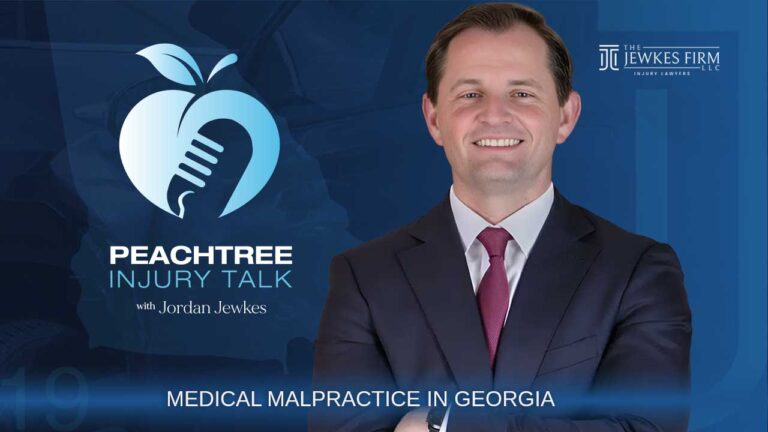
Delayed Pain After an Accident — What If You Don’t Feel Hurt Right Away?
In this episode of Peachtree Injury Talk, attorney Jordan Jewkes discusses the common issue of delayed pain following car accidents. He explains that symptoms often
Home | Podcasts | Peachtree Injury Talk | What Happens If You’re Injured as a Passenger? Know Your Rights
Peachtree Injury Talk with Jordan Jewkes
In this episode of Peachtree Injury Talk, attorney Jordan Jewkes explains how if you’re injured as a passenger in a car accident, you usually aren’t at fault—and that gives you strong rights. You can file a claim against the at-fault driver, the driver of your own vehicle (even if it’s a friend), or both if they share fault. While technically claims name individuals, insurance companies typically pay. If both drivers deny responsibility, a lawsuit might be necessary to sort out fault.
To protect yourself financially, purchase uninsured/underinsured motorist coverage (UM/UIM)—it’s cheap and travels with you. And if you’re nervous about filing against someone you know, remember: insurance is there to cover exactly these situations.
| 00:00 | Narrator: Welcome to Peachtree Injury Talk with attorney Jordan Jewkes. |
| 00:05 | Jon Clemence: Welcome to Peachtree Injury Talk with attorney Jordan Jewkes. Jordan strives to give injured victims a voice and provide strong advocacy against an often broken system. My name is Jon Clemence, and today's episode is What Happens If You're Injured as a Passenger? Know Your Rights. So, Jordan, first of all—welcome back. |
| 00:23 | Jordan Jewkes: Yeah, hey, thanks, John. Always good to be here. I appreciate you hosting again. |
| 00:28 | Jon Clemence: Yeah, I’m excited to talk to you. I feel like our conversations just fly by, so this should be a lot of fun—even if the subject isn’t exactly “fun,” it’s definitely important. So let’s jump in. If someone is injured as a passenger in a car accident, who can they file a claim against? |
| 00:44 | Jordan Jewkes: That's a fantastic question, and it's something we see more and more—especially with the rise in rideshare services like Uber, Lyft, and others. Passengers, whether they're in the front seat, back seat, or anywhere in the car, are typically blameless. So they often have multiple potential claims. You can bring a claim against the other driver who hit the car you were in. But you also need to look at the driver of your own vehicle—especially if they were partially at fault. That’s easy when it’s a rideshare driver, but it gets trickier if it’s your buddy driving. Then you’re asking, “Do I want to file a claim against my friend?” But still, passengers are 99.9% of the time not at fault. So we generally bring claims against all parties involved. |
| 02:05 | Jon Clemence: So when you say “bring a claim against,” am I filing a claim against that person directly, or against their insurance company? Or is there a distinction? |
| 02:14 | Jordan Jewkes: There’s a distinction, but it’s not always meaningful. Before a lawsuit is filed, you’re usually dealing directly with that person’s insurance company. Once you file suit, though, the claim names the driver—or possibly their employer, if it’s a commercial vehicle. The insurance company then steps in to defend and indemnify them. So while you're technically suing the person, practically speaking, the insurance company is the one paying the bill—unless that person doesn’t have insurance or has significant personal assets worth pursuing. |
| 03:13 | Jon Clemence: Got it. And you mentioned fault, but sometimes it’s not just one driver’s fault. What happens when both drivers share fault? |
| 03:29 | Jordan Jewkes: That’s where things get tricky. Many states—including Georgia—have laws that allow for fault to be apportioned. That means liability can be split between multiple drivers based on percentage. If both drivers and their insurance companies point the finger at each other and refuse to accept any blame, then often the only way to resolve it is to file a lawsuit. That puts the decision in the hands of a jury, who will assess the evidence and assign fault. In the process, through discovery and investigation, things often become clearer. Sometimes both sides agree to split the blame 50/50 and settle accordingly. But yes, it can be complex—especially at first. |
| 05:20 | Jon Clemence: Is that mostly because neither party wants to keep racking up legal fees? |
| 05:27 | Jordan Jewkes: That’s definitely part of it. But often, once we uncover more evidence—like camera footage or inconsistencies in witness statements—things become harder to dispute. Credibility becomes key. If one driver’s story starts to fall apart, their insurer may be more willing to settle. But if both sides stick to their version, it may ultimately require a jury to sort it out. |
| 06:20 | Jon Clemence: That makes sense. Now, let me ask a sort of “TV legal drama” question. Let’s say a company truck sideswipes me, and I think, “They’ve got deep pockets. I want to sue for $10 million for pain and suffering.” Is that a real thing? Or are there limitations? |
| 06:32 | Jordan Jewkes: That’s a great question—and a common misconception, often fueled by media coverage. You're referencing the infamous McDonald's hot coffee case, which people think was just someone trying to hit the jackpot. But that case actually involved severe burns and a company that had ignored known safety risks. In any personal injury case, you're entitled to be compensated for: - Medical bills - Pain and suffering - Future medical care - Lost wages - Permanent disability What you can claim isn't unlimited—but the value of those claims depends on the evidence. A jury ultimately decides what’s fair based on what they see and hear. And any massive verdict—whether it’s $10 million or more—goes through a judge and is based on damning facts, not just wishful thinking. There’s no “jackpot” without very real harm and liability. |
| 10:59 | Jon Clemence: That’s helpful. And I appreciate the real story behind the McDonald's case—it really changes your perspective. |
| 11:09 | Jordan Jewkes: Absolutely. It wasn’t just someone trying to cash in—it was about holding a company accountable after ignoring safety for years. |
| 11:37 | Jon Clemence: Let me ask about insurance. What if the at-fault driver doesn’t have insurance—or not enough? |
| 11:50 | Jordan Jewkes: That happens more than you’d think. In Georgia, the minimum liability coverage is $25,000. In other states, it’s even less—or not required at all. The best protection is to purchase uninsured/underinsured motorist coverage—UM/UIM. That’s your own insurance policy that kicks in if the other driver has no coverage or insufficient coverage. It’s affordable—just a few extra dollars a month—and it travels with you, no matter whose car you’re in. I always tell people: if you do one thing to protect yourself, buy UM/UIM. |
| 13:58 | Jon Clemence: Totally agree—I’ve added that to my policy, and it’s not expensive. Now, last question: What if the at-fault driver is someone I know—a friend or family member? What if I’m nervous about filing a claim against them? |
| 14:23 | Jordan Jewkes: That’s a tough one. It’s going to affect the relationship—there’s no sugarcoating that. But reasonable people understand: that’s why they bought insurance. If they caused an injury to you—someone they care about—they should support you doing what you need to do to recover. The real strain comes if the insurance company won’t pay and a lawsuit becomes necessary. Depositions, court dates—that can feel personal. But again, the goal is to get compensation for your injuries, not to attack the person. Also, a bit of prevention: don’t ride with someone you know drives recklessly or while impaired. That’s one of the best ways to avoid this situation in the first place. |
| 16:28 | Jon Clemence: Yeah, great advice. Well Jordan, as always, I feel like we’ve just scratched the surface and it's already time to wrap up. |
| 16:40 | Jordan Jewkes: Thanks, John. Always great to talk with you, and I hope folks find this information useful. |
| 16:47 | Jon Clemence: Absolutely. Thanks to everyone for joining us on Peachtree Injury Talk with Jordan Jewkes. To connect with Jordan and his team, visit jewkesfirm.com (https://www.jewkesfirm.com). Be sure to like, subscribe, and leave a review so we can help more people with this important information. Until next time, have a great day. |
| 17:08 | Voiceover: Thanks for watching. Be sure to hit that like and subscribe button and leave us a review in the comments. |

Peachtree Injury Talk is a podcast by Kevin Rosenquist featuring legal insights and practical advice from Georgia-based attorney Jordan Jewkes. The show focuses on personal injury law, offering listeners expert guidance on navigating insurance claims, understanding legal processes, and protecting their rights after an accident. Each episode dives into real-life case examples, common challenges injured individuals face, and actionable tips for dealing with insurance companies and legal hurdles.
Episode Summary
In this episode of Peachtree Injury Talk, attorney Jordan Jewkes discusses the common issue of delayed pain following car accidents. He explains that symptoms often don’t appear immediately due to factors like adrenaline and inflammation, especially with spine, head, neck, and lower back injuries. Delayed pain is normal and can occur days or even weeks after the incident. Jewkes emphasizes the importance of seeking medical attention as soon as symptoms arise to document the injury and support any personal injury claim. While insurance companies may challenge claims if treatment is delayed, being honest and obtaining timely care can protect a victim’s rights. Jewkes advises anyone experiencing pain after an accident to get evaluated promptly, starting with urgent care or a primary doctor if specialists aren’t immediately available. The episode encourages viewers to understand their rights and seek legal help through Jewkes’ firm if needed.
Timestamps
00:00 – Introduction to Peachtree Injury Talk
00:21 – Why Injuries Show Delayed Pain
01:40 – Common Injuries with Delayed Symptoms
03:17 – Impact of Delayed Treatment on Claims
04:55 – What to Do When Symptoms Appear Later
06:13 – Can You File a Claim After Delayed Treatment?
08:51 – Final Advice from Jordan Jewkes
10:17 – Closing and Contact Information
About the Show
Peachtree Injury Talk is hosted by attorney Jordan Jewkes, who is dedicated to giving injury victims a voice and fighting for their rights against an often unfair system. Each episode provides valuable legal insights and practical advice for those navigating personal injury claims.

What Happens If You’re Injured as a Passenger? Know Your Rights covers important legal issues surrounding passengers who are injured in car accidents. Hosted by Jon Clemence, the episode delves into who passengers can file claims against, how fault is determined, and the intricacies of handling cases involving insurance.
Jordan begins by explaining that passengers in car accidents are often blameless, whether seated in the front or back of the vehicle. This is especially true with the rise of rideshare services like Uber and Lyft. Passengers have multiple options for filing claims, starting with the at-fault driver’s insurance. However, passengers should also consider the driver of the vehicle they were in, especially if that driver may share some responsibility for the accident. While it may be uncomfortable to file a claim against a friend or family member, passengers still have the right to seek compensation.
Jon asks whether a claim is filed directly against the person or their insurance company. Jordan explains that while a lawsuit names the individual driver or potentially their employer (in the case of a commercial vehicle), the insurance company typically handles the defense and indemnification. It is common to interact with insurance companies before filing a lawsuit.
The conversation shifts to situations where both drivers may be partially at fault for an accident. In these cases, liability is apportioned based on each driver’s percentage of fault. This can complicate the process, especially when insurance companies refuse to accept blame. In these scenarios, a lawsuit may be necessary, with a jury ultimately determining fault based on evidence. Jordan highlights that factors like camera footage or inconsistencies in witness testimony can clarify who is responsible, encouraging settlements before a trial.
Jon asks about the possibility of suing for large sums, using the infamous McDonald’s hot coffee case as an example. Jordan clarifies that while media portrayals often suggest such lawsuits are frivolous, legitimate personal injury claims can seek compensation for medical bills, lost wages, pain and suffering, future medical care, and permanent disability. However, there are limits to what can be claimed, and a jury will determine the fairness of the compensation based on the evidence presented.
Jordan emphasizes the importance of purchasing uninsured/underinsured motorist (UM/UIM) coverage. This relatively inexpensive coverage can protect passengers in the event that the at-fault driver has no insurance or insufficient coverage. It follows the policyholder no matter whose car they are in, making it an essential safety measure.
The episode concludes with a discussion on the emotional difficulty of filing a claim against a friend or family member who caused the injury. Jordan acknowledges the strain it may put on personal relationships but stresses that insurance is there for a reason. If a loved one causes harm, they should support the injured person’s right to seek compensation. To avoid such situations, Jordan advises against riding with individuals who drive recklessly or under the influence.
In the end, Jordan and Jon encourage listeners to stay informed about their rights and consider taking steps to protect themselves, such as purchasing UM/UIM coverage. For more information, reach out to The Jewkes Law Firm at (770) 771-5130.
This show is designed to deliver general information regarding the law. Our guests will not provide tailored legal advice. If you have a personal issue and need legal support, get in touch with us for a free consultation with a Jewkes Firm attorney.
Subscribe to our newsletter for essential updates and expert legal advice.

In this episode of Peachtree Injury Talk, attorney Jordan Jewkes discusses the common issue of delayed pain following car accidents. He explains that symptoms often

In this episode of Peachtree Injury Talk, attorney Jordan Jewkes discusses the legal considerations parents should know if their child is injured in an accident.

In this episode of Peachtree Injury Talk, attorney Jordan Jewkes discusses medical malpractice law in Georgia, explaining that malpractice occurs when a medical professional violates
Welcome to Peachtree Injury Talk—your essential podcast for navigating the often bewildering landscape of personal injury law.
Jordan Jewkes shares real-life cases, common pitfalls to avoid, and tips on securing the compensation you deserve.
Tune in to Peachtree Injury Talk.
The information you obtain at this site is not, nor is it intended to be, legal advice. You should consult an attorney for advice regarding your individual situation. Contacting us does not create an attorney-client relationship.
